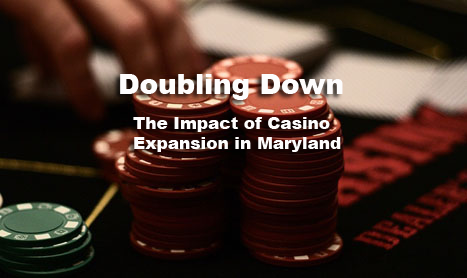WASHINGTON – The implementation of table games and 24-hour gaming in Maryland will create employment opportunities, but competition from Horseshoe Casino in Baltimore and the proposed casino at the National Harbor will likely affect the labor market geographically, according to experts.
Maryland voters approved a referendum last November expanding gaming in Maryland. It allowed for a new casino in Prince George’s County, the operation of table games in Maryland, and 24-hour gambling.
“Tables create jobs, they create a whole heck of a lot more jobs than slot machines,” said Frank Fantini of Fantini Research, a gaming industry e-daily.
Each 24-hour table will employ about five dealers and additional staff such as supervisors and money handlers, Fantini said.
Gov. Martin O’Malley released a statement estimating that an additional 2,300 would result from the gaming expansion.
Pennsylvania introduced 624 table games in July 2010 which led to 3,649 new hires the first year. By June 2012, 5,480 people had been hired to administer the games, said Richard McGarvey spokesperson for the Pennsylvania Gaming Control Board.
Maryland Live!, the state’s largest casino, employs 1,500 and plans to hire 1,200 more people with the implementation of table games and 24-hour gaming, according to a company press release.
The casino will add 150 table games including blackjack, craps and roulette and plans to be open 24-hours starting on Dec. 26.
Fantini confirmed that 1,200 new jobs would be a reasonable estimate for a casino installing 150 table games.
Hollywood Casino in Perryville is also implementing 15 to 20 table games and plans to offer around-the-clock gambling on weekends. They expect to add up to 100 employees.
Ocean Downs is considering adding table games.
Fantini said that table games will not only increase the amount of available jobs, but will likely increase tips the employees earn.
“What it tends to do is that tends to bring in people who tip heavily… Its not uncommon to make $90,000 or $100,000 a year as a dealer or cocktail waitress at upscale properties in Las Vegas,” he said.
Alan Woinski of Gaming USA Corp., a gaming industry consultant, agreed that longer hours and table games would create more, better-paying jobs, but he warned that the new casino locations in Baltimore and National Harbor will cannibalize the business of the others, leading to lower tax revenues for the state.
“This is what happens when the state does not think logically when it gives out licenses,” he said, adding that the National Harbor casino is more likely to pull business from Maryland Live! than it is to pull business from out of state.
“The logic of the state is that we’re going to draw from Virginia and Washington. What they don’t realize is that Maryland Live! is drawing from Virginia and Washington,” Woinski said.
He said that Hollywood Casino and Ocean Downs are likely to be the most affected by the increased competition because their revenues have been dropping.
The Baltimore Business Journal reported that Hollywood Casino Perryville profits dropped 40.5 percent from November 2011 and Casino at Ocean Downs dropped 5 percent from $3.5 million in October. However, Casino at Ocean Downs’ revenue increased 6.9 percent compared with November 2011.
If the new casinos siphon enough revenues from the older ones, the established casinos may have to reduce staff to save costs.
Woinski said that Horseshoe Casino and the National Harbor casino could hire dealers from other casinos should they be forced to cut staff. He said that it is likely to be a wash in terms of number employed directly by the casinos.
“When you add in construction jobs, it’s a gain but we’re talking years down the road,” said Woinski.
Despite the uncertainties created by the new casinos, Woinski said that having table games will be a benefit in terms of employment.
“Table games are the best thing for employment, no doubt about it.”

